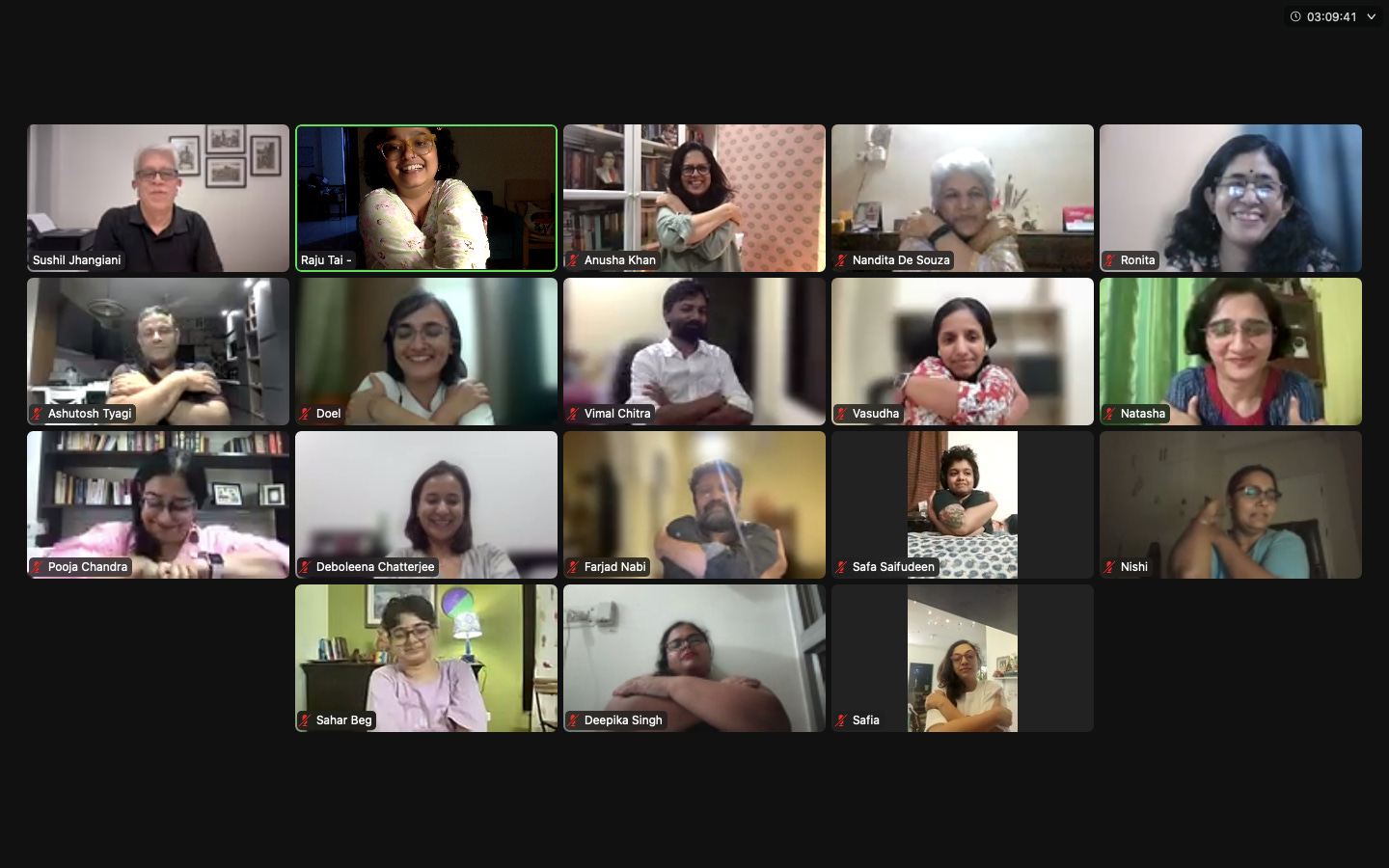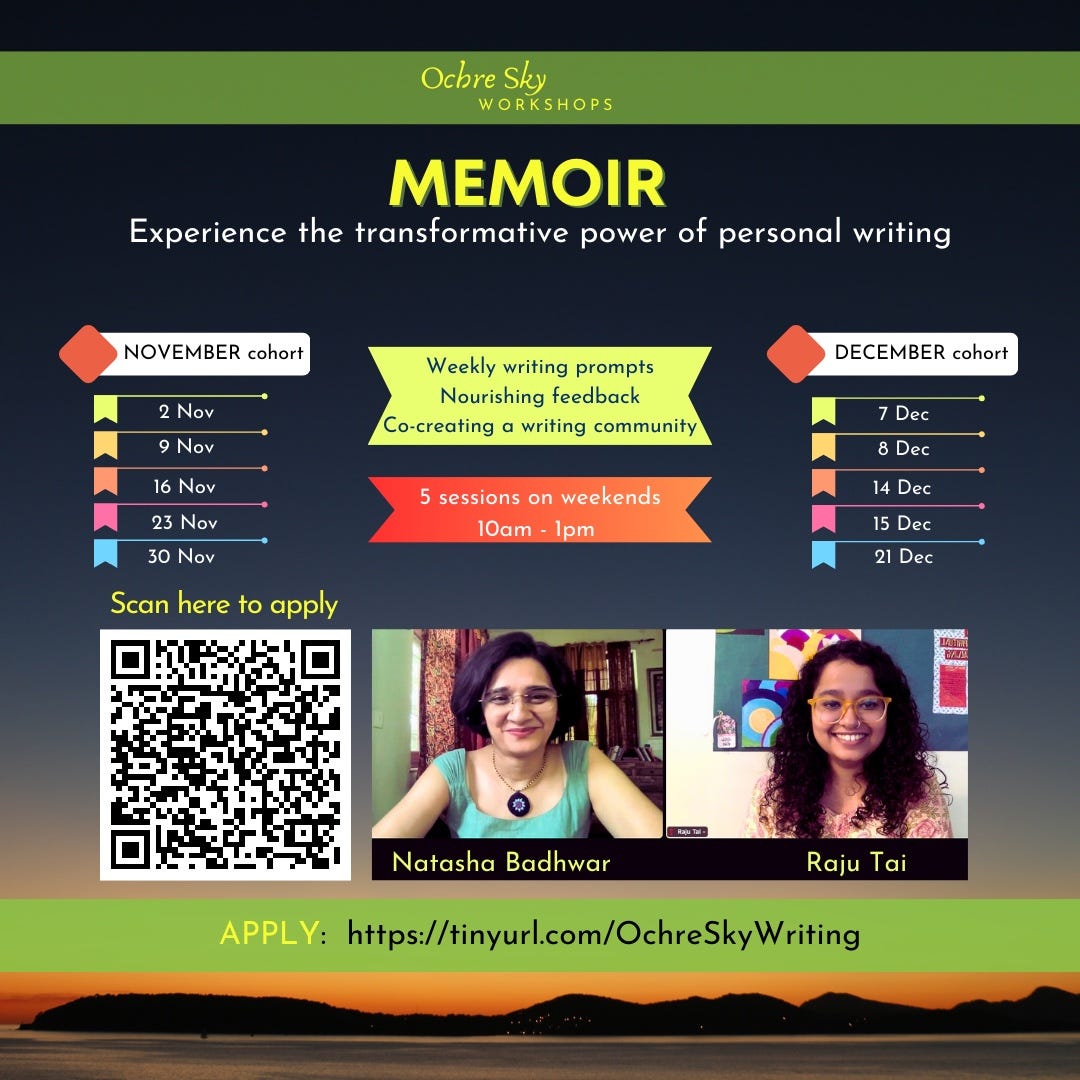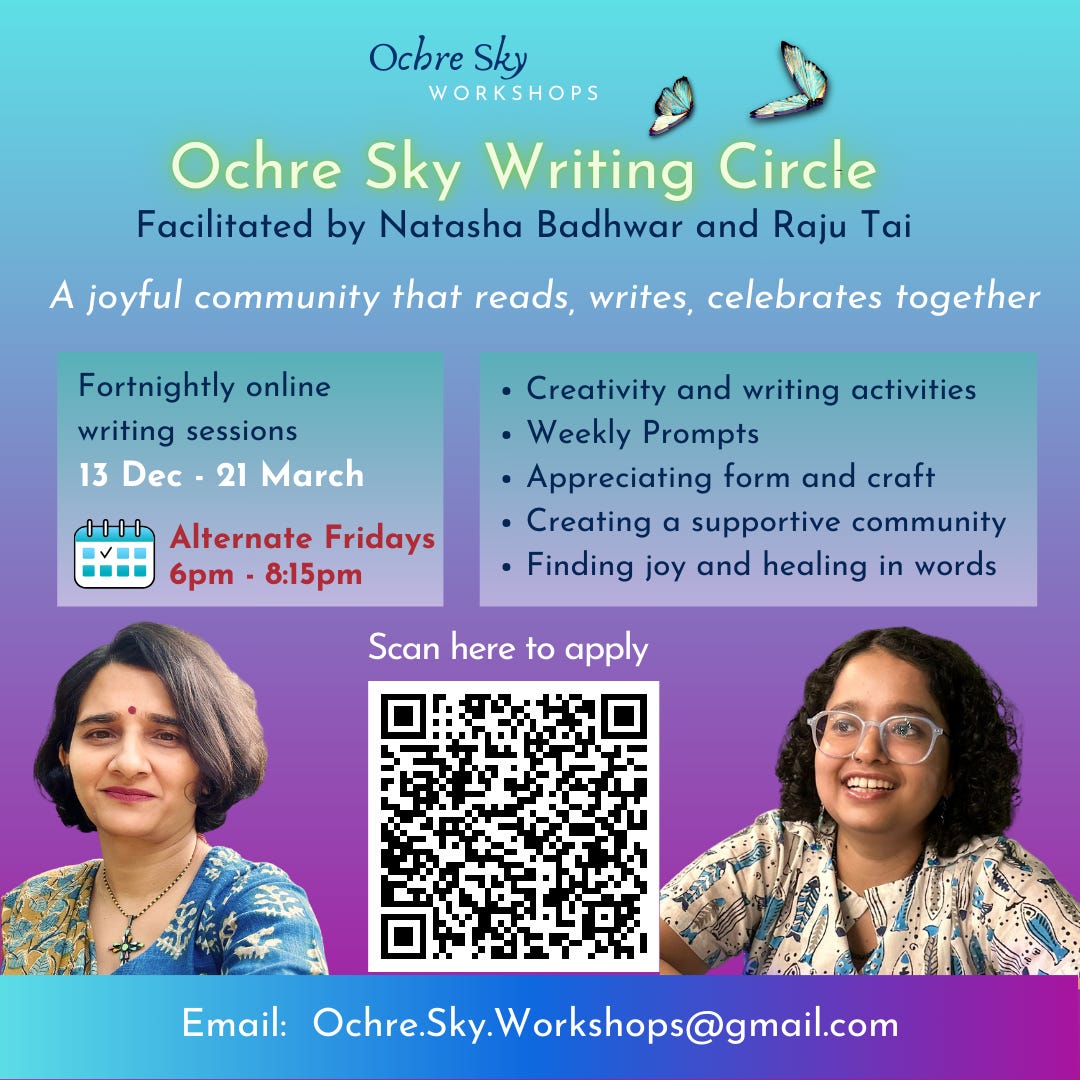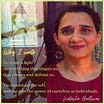Stories that demand to be told | #21
"When in doubt about how to proceed, my intuitive strategy is to first decide what I will wear. Look good, feel good, and all the rest of the decisions will fall in place..."
This is the 21st edition of Stories that demand to be told, a curated spread of the most evocative, resonant, real stories. Welcome to Ochre Sky Stories, a home for writers from the Ochre Sky Workshops, facilitated by
and .1. We have to be the light in the tunnel by Shelja Sen
It took me a lot of courage to speak to my psychiatrist that I have thoughts of killing myself. I regretted it immediately as I saw his eyes turning hard as he called in my mother to tell her I was ‘high risk’ and put me on medication.” “When I told my school counsellor that I had constant thoughts of suicide, she scolded me, ‘you children have made this into a fashion’ and changed the topic.” These words made me wonder about what it is about children’s anguish and talk of suicide that makes us turn away or rush in with quick fixes? Imagine if it is so difficult for us, how painful it would be for them?..
..Saving our children’s lives is a civil rights issue and not an individual problem. Change can only happen as a collective. There is no light at the end of the tunnel. We have to be the subversive light in the tunnel.
2. Sanobar Sabah in Conversation with Reema Ahmed and Raju Tai by
SS: What advice would you give to other aspiring writers who may also be managing mental health issues, based on your own journey?
Reema Ahmad: I’d say lean into your pain. Allow it to be the vessel and window to your particular challenges. I don’t think any one thing works for anyone but if we can try and be less afraid of our voice and simply let it out and observe it, it can be a beautiful opening to seeing ourselves differently; both as people struggling with mental health issues and as writers.
Raju Tai: Spoil yourself, honey. Just buy the best stationery you can afford, a desk and chair that loves your bum and back. If you’re short like me, get a footrest so your feet are well-rested. Also, get some sneakers. Spoil yourself with therapy and plants and long leisurely walks. When you are struggling financially, like most of us will at some point, for the sake of our sanity or creativity, spoil yourself with love. Say the cutest things to yourself when you can’t write what you desperately yearn to write.
3. Conrad in Calcutta by
Józef did not mind getting entangled in the puzzling streets. He was sure that the friendly looking people would offer to accompany him back to The Legacy, in case he got too far away and lost track. But would not his stilted English reveal him? He wondered if their respect for him would diminish if he told them that he was from Poland, not England. Like India, Poland too had a mind of its own and a government of someone else. Though unlike India, Poland’s rulers had the same skin colour as the Polish people. That made things both better and worse.
So Calcutta, the capital of British India! Józef turned into some narrow lanes flanked by diminutive two-storey houses. It was evening, and it smelled of fish and spices, a smell so piquant and appetizing that it almost made him want to barge into a house and demand to be served. At tiny squares where two perpendicular lanes met, there would be tea stalls thronged by men. Some of the men carried books in their hands, and Józef wondered what these books were about, these books that were at times being read collectively. What language were these books in: English? Farsi? Calcuttese? Just what? And how could natives show such conspicuous interest in books?
4. Why families are key to supporting children with neurodiversity by Nandita de Souza and Andre Filipe Velho
By helping families recognise and utilise their child’s strengths, interests, and what brings them joy, we can help them see their child’s potential. The neurodiversity affirming approach acknowledges that disabilities such as autism or ADHD are not just labels but are part of a broader spectrum of neurodiversity, which comes with inherent strengths and unique support needs. The goal is to shift a family’s outlook from one that is deficits-based—that is, something is ‘wrong’ and needs fixing—to one that is strengths-based and embraces their child’s neurodiversity.
Supporting not just one’s own family but also other families with lived experiences of disability can offer unparalleled emotional and practical help to all involved. FCC fosters these connections. Nothing conveys “You are not alone” as powerfully as the emotional support of other families.
5. The Class Politics of Paanta Bhat by
People, though, find it strange, that I eat Paanta bhaat and live to tell the tale. I found their disdain strange! This is a traditional dish of Bengal, so why do the middle/upper classes hold it in such contempt? A kind of answer came from an exchange on Facebook, which I read. Most of the participants had never eaten it, and, yet, all their servants did and do. The left-over rice is meant for servants, and they, naturally, make Paanta bhat. So it’s a class divide, I figured.
What still puzzled me is that out on the streets, people are constantly eating chops, cutlets, savouries, and a whole host of hot, wonderful snacks, often called ‘tele bhaaja’ — fried in mustard oil…Sometimes, the shops may be owned by the middle or upper classes, but the ‘creators’ are working class. Many of them are hard working women, young and old, Bowdis and Mashimas, who earn an extra-living by working hard in little, thatched shops, especially in the evenings. A beguni or pyaaji, costing Rs 5 or 6, with a hot cup of sweet milky tea, is stunningly fulfilling as an evening snack. Plus, a smoke in the end!
6. A queen’s promise, a festival spanning 200 years: How Phoolwalon ki sair is a testament to Delhi’s syncretic culture by
In the early 19th Century, around the time the Mughal empire began to fade, a rebellious prince began to turn into a thorn in the side of the British. All of 19, Mirza Jahangir fired at the then British resident and was exiled to Allahabad. His mother, Mumtaz Mahal Begum, made a vow: Once her son returned, she would walk barefoot from the Red Fort to Qutubuddin Bakhtiyar Kaki dargah in Mehrauli to offer her gratitude.
Her prayers were answered, and the queen decided to keep her promise. To ease her journey, it is said, the local people scattered flowers throughout her route. The flower seller also made floral pankhas (fans) offered to the Kaki dargah and the nearby Yogmaya temple. So popular was the event that it was decided to be held yearly. The result was a week-long annual celebration called the Phoolwalon ki sair or Sair-e-Gulfaroshan.
Over 200 years on, the tradition continues and serves as a testament to Delhi’s syncretic culture.
7. Lessons from the many Diwalis of my life by
That year both Afzal and I were a little unsure about what to expect on the evening of Diwali, when both his mother and my parents were near us. Unusually for him, Afzal was at a bit of a loss about how best to ensure that all the elders in his life remained at ease. His Muslim Ammi and my Hindu Mummy and Papa.
When in doubt about how to proceed, my intuitive strategy is to first decide what I will wear. Make yourself look good, that will make you feel good, and all the rest of the decisions will fall in place one by one. Create an artful exterior and half the work will get done on its own. I decided to wear a saree, a choice that was also guided by the fact that Ammi loved to see me dressed up, in the same way that my daughters cheer me now. By the time I emerged from my room, I discovered that Ammi had taken the same decision and was wearing a saree too. She had dressed up for Diwali and she giggled when I complimented her on how good she looked.
“Hurry up, we must go and greet your parents on Diwali now,” she said to us.
8. How Funny, Us Humans by
Funny how we found a fruit called cotton and drew it into threads and wove it into cloth. Funny how we wrap ourselves in it. How we blow air through holes in a hollow stick, pluck endless strings, slap and thrash drums. Funnier even, how we move our own bodies, shimmying sideways and rocking our hips.
How funny to have all this apparatus, and on most days, do nothing with it. To be at a desk staring at a flickering screen, instead of against a tree staring at the fascinating sky. To have exchanged our wilderness for intelligence only to one day worry about artificial intelligence. And then praise our leftover wilderness.
One weird thing about being bipedal is that our chests have become weirdly exposed. But the cool thing is that when one vulnerable chest meets another, we call it a hug. We hold one spine in parallel with another, place arm upon arm and call it a cuddle. When the places from where we eat and speak and smile meet — solid, liquid, and gas state become one, and we call it a kiss.
Discover the transformative power of personal writing with Natasha Badhwar
and Raju Tai at Ochre Sky Stories Memoir Workshop.

















